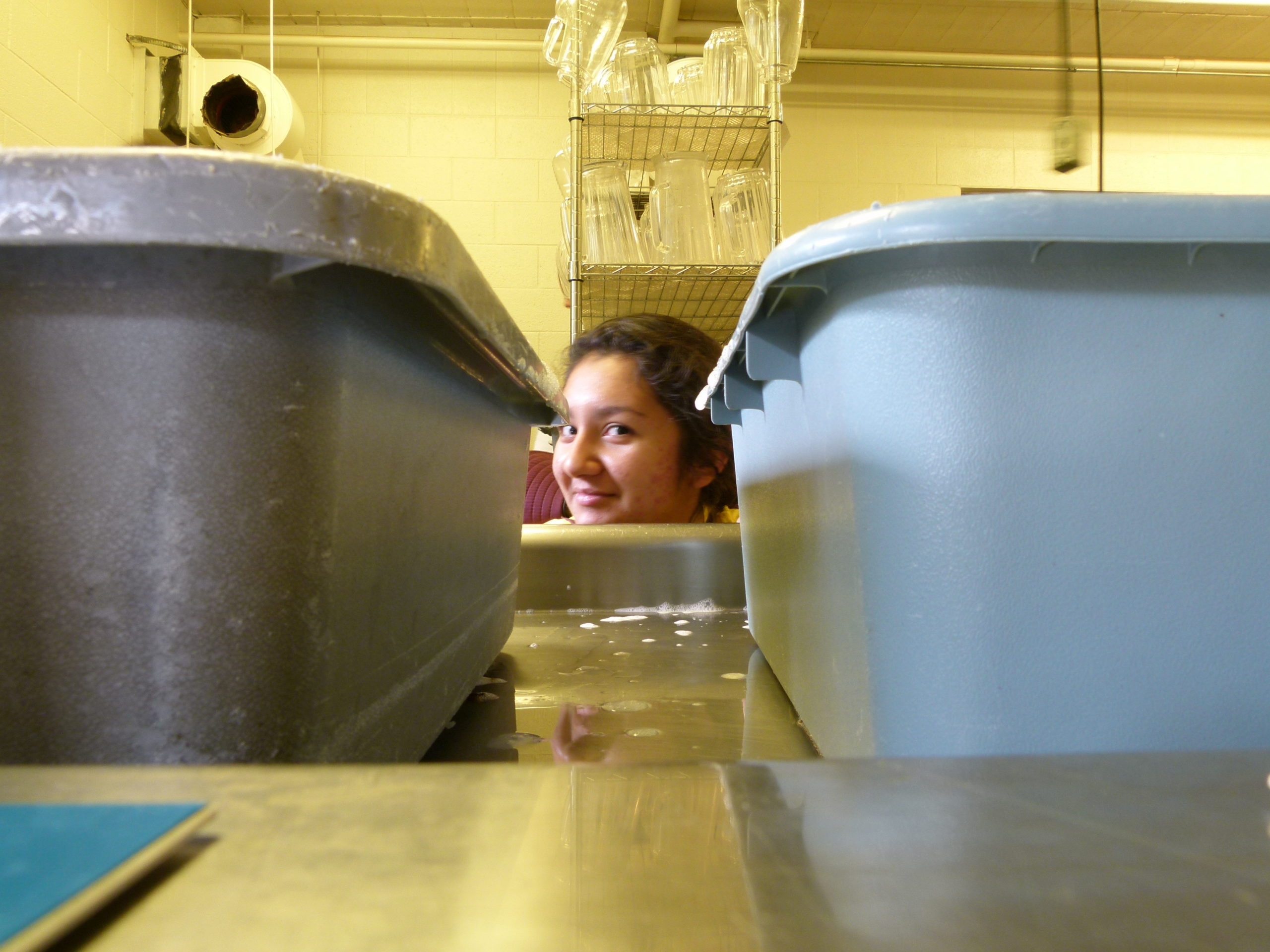Explaining LEAD #3 with Jerome Meeds
‘Preach the Gospel always, and if necessary, use words.’ These words attributed to St. Francis of Assisi describe Dunrovin’s philosophical approach to youth ministry. Executive Director Jerome Meeds structures a life-changing, transformative experience for youth through activities designed to grab their attention and touch their hearts in Dunrovin’s LEAD (Leadership Experience At Dunrovin) program.
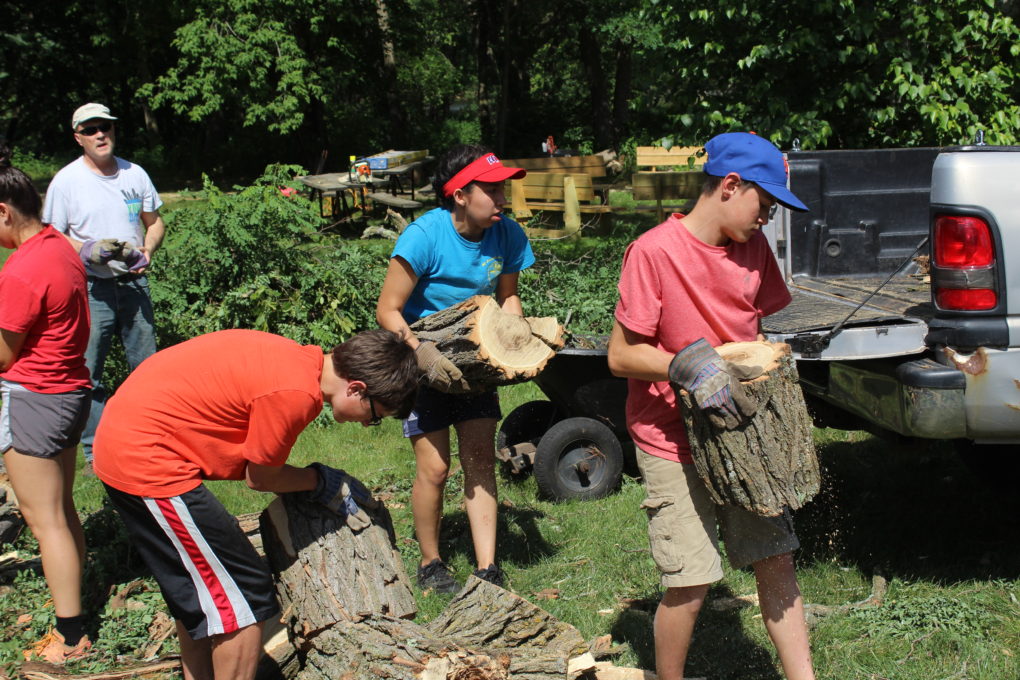
LEAD’s stepping stone structure to youth ministry promotes growth in Christian faith and leadership skills by varying degrees based on a student’s age or experience with the program. Youth leaders act as mentors for students younger than themselves in the program. As they work through the various steps of LEAD, Jerome and the Dunrovin summer program counselors invite students to imitate the love of Christ through service. Spiritual and corporal acts of mercy, via acts of service, become daily lived out experiences for young people in the most intensive stepping stone of LEAD, DLITE (Dunrovin Leadership Intensive Training Experience).
One could say that DLITE is an Experience. Of. Extreme. Service.
A heart willing to serve is so integral to the DLITE program that the teenager must commit to it as part of the application process. These are the promises made by the teen when applying for DLITE:
- Have a servant heart.
- Come with a positive attitude.
- Be open to the program, God’s work in your life, and personal growth by participating fully in all activities.
- Set a good example for the students.
- Be Christ to others and strive to see Christ in them.
- Act responsibly, and do not abuse the freedom you are given.
- Respect, obey, and listen to those in authority.
- Create an encouraging atmosphere.
- Unselfishly love and respect each person on the team.
- Be open to learning and to growth through challenges.
- Grow as a young Christian leader.
- Do not become involved in or seek a romantic relationship during the retreat.
- Be confident and willing to step up.
- Be ready to take on leadership responsibilities.
Fairly lofty for a teenager. Quite appropriate for a Lasallian lifestyle. As followers of St. John Baptist de La Salle, we highly esteem the typical teenager. However, for most typical teenagers, virtue and the ensuing acts of service do not come naturally. In his discussion on the virtue of gentleness in The Twelve Virtues of a Good Teacher, Lasallian Brother Agathon wrote in 1785:
It is very important to oppose the tendencies in young people…[toward their] self-love which pays attention only to their own comfort and the attitude which makes them think everything is due to them, while they owe nothing to anyone. Such are the defects against which open war must be declared.
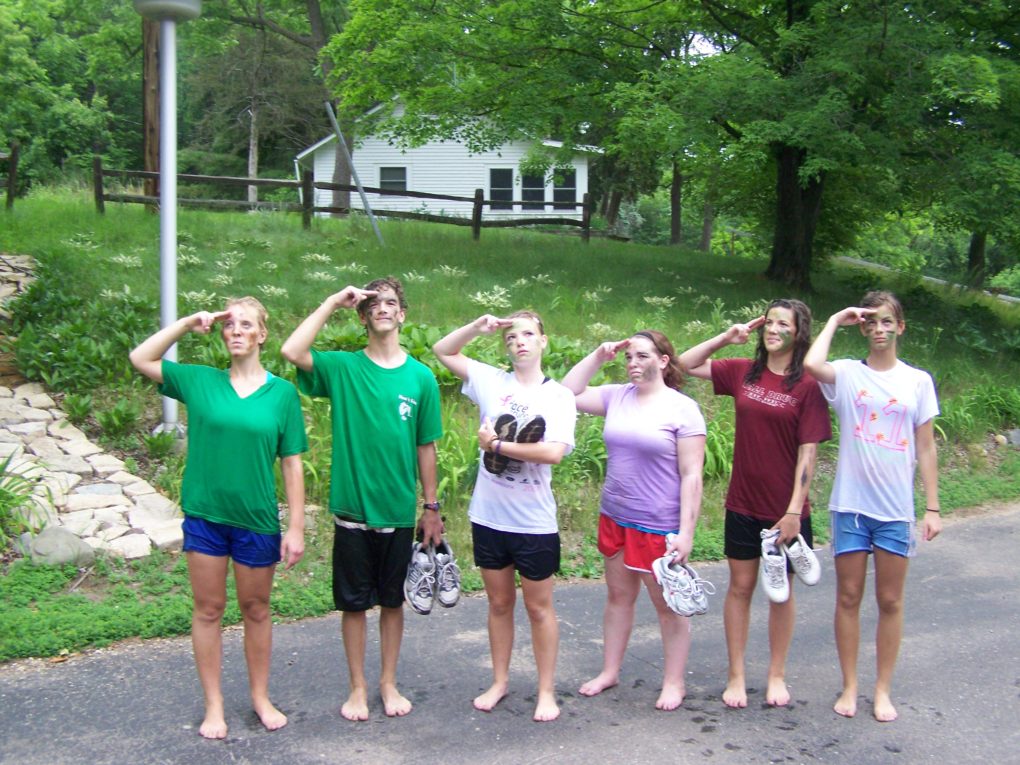
Is there a better way to declare war in young people than to offer them practical experiences of service? Dunrovin’s youth program wages war on the selfish sense in many high school students who hear constantly that life is about them. No! The Christian life is about others. Christ Jesus called his followers to be servants. Jerome developed the DLITE program with an abundance of service to channel youthful energy toward something good for others. Service helps young people get outside themselves. Service helps people of ALL ages get outside themselves; we all tend to become self-absorbed. When serving is done well, it becomes about someone else, not about self.
DLITE high school students serve in numerous ways.
The first component of DLITE service offers its relational and most impactful component. DLITE mentors take on the role of big brother or big sister by serving the middle-school students who concurrently come to Dunrovin in the Summer Leadership Camp, at-risk children from inner-city Chicago or from the Twin Cities area. DLITE mentors come alive when they see the difference they make in a child’s life, and they are surprised at how much fun it is to make a difference. A switch clicks inside many DLITErs when they experience this joy. Jerome believes this switch is a part of growing up – to learn ‘life is not all about me and taking care of my needs.’ Adults may be responsible for many people, such as spouse, children, aging parents, coworkers, etc. Young people often have not had this responsibility. Young people who serve others take a giant step toward adulthood and often feel joy in this maturity and growth.
Quotes written on DLITE evaluations
- I learned to really try to get to know the kids and talk with them, even when it is hard, because it does affect them in a good way when I am positive and joyful. I also learned to serve and just be there for the kids and think of them before myself.
- WHAT I CAN ACCOMPLISH IN THE WORLD MUST BE DONE.
- I learned that love is sometimes the most valuable thing I can give someone. I learned to pour into people even if I won’t see them again.
- I will remember the love and joy of the children and learning to serve them even when it means doing something that I don’t like to do.
- I learned that serving others is a joy, not a burden.
A second component of service involves practical application. DLITE teenagers serve the concrete needs of the Summer Leadership Camp middle-school students. Most are Latino children. Many, but not all, of our DLITE youth are White. DLITErs experience service as a role change. Think of the humdrum chore of doing dishes. During Summer Leadership Camp, our Latino kids bring their dishes to the White kids, who wash their dishes. Without words, this speaks ‘You are valuable’ to the children.
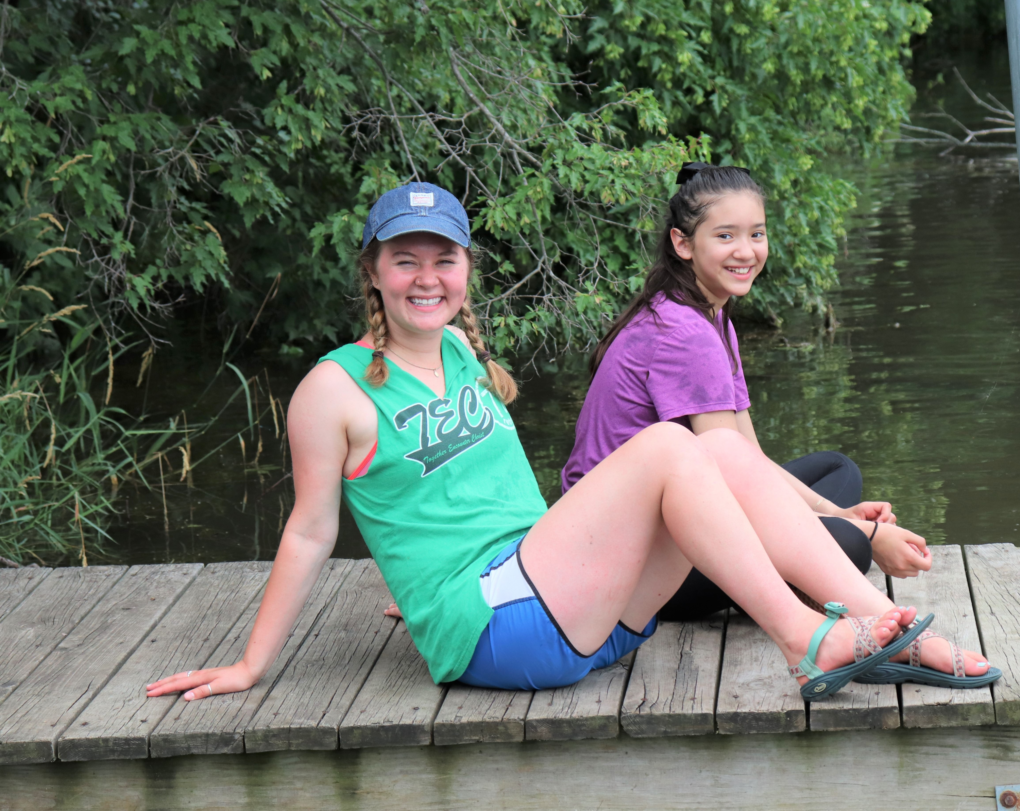
Jerome and his summer program counselors clearly speak to the DLITE youth that they are not fabulous because they are serving. The fabulous part is the cultural exchange with growth available to all. The virtue of gentleness grows. DLITE mentors offer relationship, fun, and faith to the Chicago or Twin Cities children. Conversely, the children offer hope, courage, friendship, and resilience to the DLITE mentors. This bridge between cultures broadens the worldview on both sides of the bridge. More is happening than playing games.
DLITE mentors also practically serve behind the scenes. The children do not know that after they leave, DLITErs clean the bedrooms and Retreat Center. This practical service is quite difficult because after five days of leadership training and service, DLITErs are exhausted. The summer program counselors come alongside the DLITErs in service. They model how to pray for the children as an act of love while cleaning.
I love the kids so-o-o-o-o-o-o much that my heart aches!
The only thing that would make camp better is if the campers didn’t have to leave.
Introducing (drumroll, please) the Extreme Service Project. This challenging teambuilding event pushes the high school students in physical, mental, and emotional growth.
Some projects are more physically difficult than others. In one Extreme Service Project, the DLITE teams cleared a woodland trail. Could they move trees and enormous logs with the teens? No one knew if it could be done. In fact, a goal of the Extreme Service Project is to give the DLITE team a task so difficult that they cannot fathom completing it. Yet, time after time, each DLITE team works together. They dig in. They do it. Most of the DLITErs have never worked so physically hard. They take ownership of the project and are proud of getting their Extreme Service Project done. Beginning unsure of how to accomplish the task, they succeed by serving one another on the team.
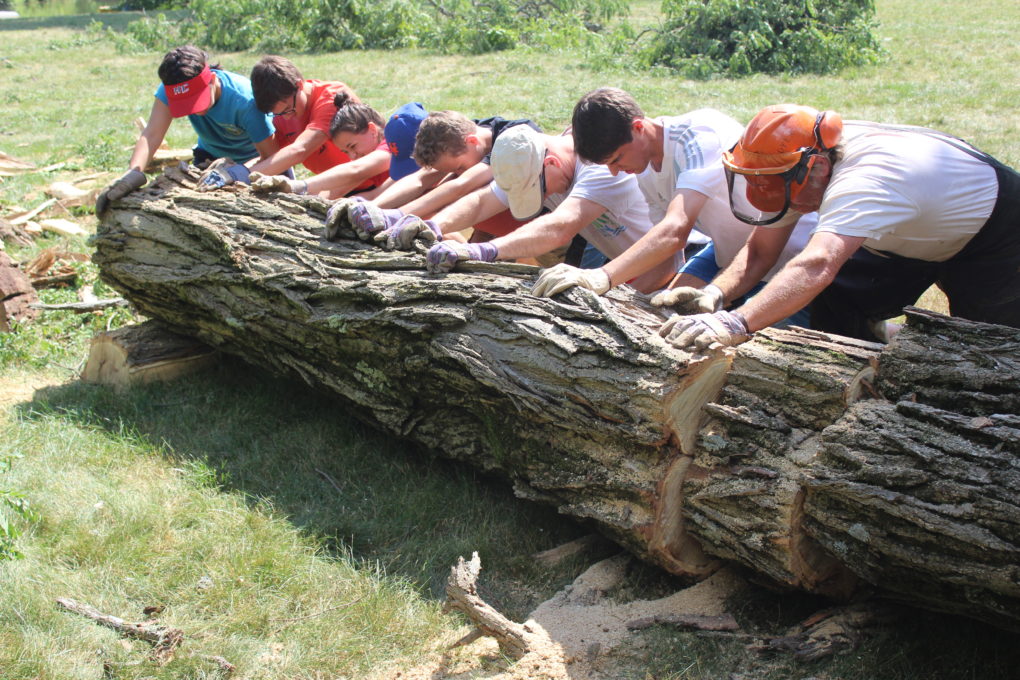
Other Extreme Service Projects mentally challenge the youth. One DLITE team was tasked with removing a 30-foot flagpole and its grounded concrete foundation. The team looked at the flagpole and did not know how they would get it out. Jerome did not know how they would get it out either. Jerome and the program counselors stretched the team to think creatively. Be problem solvers. ‘They expect me to know the answers, but I put it back to them. “You figure this out.” And they do.’ (Jerome Meeds)
Extreme Service Projects are real. DLITErs can come back and see in future years the results of their Extreme Service Projects – a fixed bridge, a planted tree, a leveled soccer field. In 2019, DLITE teams moved huge boulders sunk mostly under the grass. Jerome asked the DLITE team, ‘Do you trip on these rocks sticking out of the lawn?’ Yes, many kids tripped during field games. Removing huge, sunken boulders was a learning opportunity. Jerome used the rocks as an analogy for the young people, ‘Like a lot of things in life, we don’t know what we are in for until we start digging. Life happens. Problems can be solved.’ Some of the boulders were so big that they could not be dug out without big equipment. The DLITE teams figured out how to bury them deeper or how to chip away at the rocks so they were no longer trippers. Young people are creative and strong. Young people have much to offer. Through service, they can build confidence to change the world.
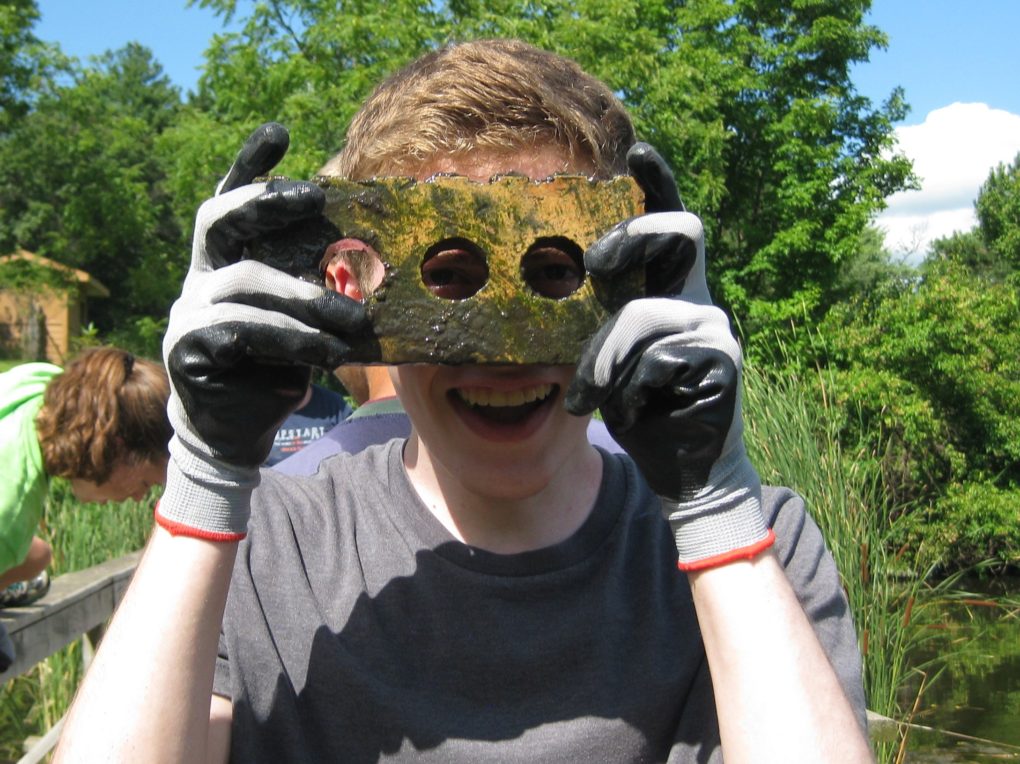
The DLITE team is never alone during their service. Program staff members model generosity and virtue during the DLITE retreat. And they always make it fun. In the 2019 Rock Removal Project, each rock received a name. In the 2018 Tree Planting Project, each tree received a name. DLITErs sing and dance while doing dishes. They learn to have fun in the midst of the service.
My Dunrovin Story – Maggie Schmidt, RN
Maggie currently works as a registered nurse and serves in Kairos Youth Ministry, Lansing, Michigan. She speaks of her Extreme Service Projects as a DLITEr:
During my high school years, I participated in many extreme service projects as part of my time on DLITE teams. These service projects taught me to get outside of myself and be ok with being uncomfortable. My junior year, my team’s service project was to reset one of Dunrovin’s bridges back on its foundation. In order to do this, we had to wade waste deep into the muddy pond. Usually gross things don’t bother me too much, but I absolutely hate fish. I realized that in order to fix this bridge, I would have to wade into the pond that was full of some good-sized fish who weren’t afraid to nibble at my toes. It sounds funny, but for me, that took some death to self. In that moment, I had to let go of my preference and comfort in order to serve. While experiences like these may seem really small, I know they have helped form me into a better servant of God.
My Dunrovin Story – Nick Vance
Nick currently studies and serves as a 2nd year seminarian in the St. Paul Seminary, St. Paul, Minnesota. He participated in DLITE retreats through high school and worked as a summer program counselor for four years. This is Nick’s testimony about servant leadership:
The greatest thing I learned on DLITE is that I don’t need to put qualifications on my service and leadership. So often, I want to find reasons why I’m not able to serve: my own inadequacy, my fear, my insecurity, my schedule… Christ tells us that “he who would be the greatest among you shall be your servant.”
When I showed up for my first week of DLITE, there were people who told me that I could be a leader, that I didn’t need any sort of qualifications, because all leadership begins with service. To borrow from Dr. Martin Luther King, “You don’t have to know about Plato and Aristotle to serve. You don’t need to know the theory of relativity to serve. You don’t need to know the second law of thermodynamics to serve! You only need a heart full of grace, a soul generated by love, and you can be that servant.”
There were people running the DLITE program who looked at me, an insecure little fourteen-year-old, and were willing to tell me that I could go out and serve those in need. And those weeks of service, of being poured out for others without qualifications on my service and leadership, taught me valuable lessons. Those lessons have influenced me to this day, as I have been brought into various leadership positions of organizations, ministries, men’s households, and now seminary. I owe it to the people who told me, at a young age, that I don’t need all these qualifications to serve and lead.
LEAD‘s goal is to touch hearts and form young lives. All week long, DLITE, the most intensive step of LEAD, teenagers step outside their comfort zones to serve others. Whether their efforts succeed or fail, all make an impact. Being a leader does not mean being perfect. Confidence builds when youth realize they do not need everything figured out in order to help others. As they practice servant leadership, they grow.
For more information about Dunrovin’s LEAD programs, contact Jerome Meeds at 651-433-2486 or jerome.meeds@dunrovin.org

